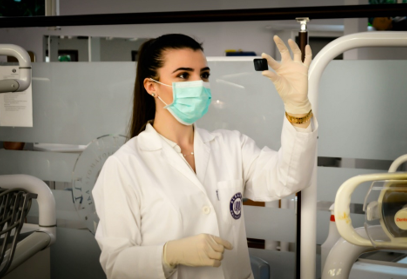How Acadia Healthcare Is Helping to Address a Behavioral Health Crisis That Affected 60 Million Americans
- Updated on: Nov 5, 2025
- 3 min Read
- Published on Nov 5, 2025

How Acadia Healthcare Is Helping to Address a Behavioral Health Crisis That Affected 60 Million Americans in 2024
The scale of America’s behavioral health challenges has intensified in recent years. Data from the U.S. Department of Health and Human Services’ Substance Abuse and Mental Health Services Association shows that any mental illness (AMI) rose from 52.9 million Americans in 2020 to 58.7 million by 2023. Similarly, serious mental illness (SMI) increased from 14.2 million to 14.6 million, while substance use disorders jumped dramatically from 40.3 million to 48.5 million during the same period. The most recent national survey data confirms approximately 48.5 million individuals (17.1% of the U.S. population) ages 12 and older met criteria for substance use disorder.
Acadia Healthcare, the largest standalone behavioral healthcare provider in the United States, operates a network of affiliated facilities at the forefront of a growing national mental health crisis. It maintains a network of approximately 260 affiliated facilities across nearly 40 states and Puerto Rico, serving roughly 80,000 patients daily. The network’s operational strategy centers on treating mental health needs through four primary service lines: acute inpatient psychiatric care, specialty treatment facilities, comprehensive treatment centers, and residential treatment centers.
Acadia’s Mental Health Initiatives
“The need for behavioral healthcare in this country is increasing while the number of available beds has been decreasing, creating a broadening gap and leaving those patients who need the most care unable to get it,” Acadia CEO Chris Hunter said in a 2024 earnings call. “So, to meet that need, Acadia is in the process of investing to expand access over the next several years, including the expected construction of over 2,000 beds over the next two years.
Acadia Healthcare and its affiliates work from five strategic clinical priorities, outlined by chief medical officer Dr. Stephanie Eken and chief quality officer Dr. Navdeep Kang, include: (1) establishing uniform standards for treatment protocols, (2) addressing technology gaps through significant investments, (3) enhancing safety measures, (4) expanding access to care, and (5) fighting stigma surrounding mental health treatment.
The technology gap represents a particular challenge. Unlike general medical facilities, behavioral health providers were excluded from the HITECH Act, which provided incentives for adopting electronic medical records (EMRs). Acadia has committed to investing an additional $100 million to modernize the technology infrastructure and improve patient monitoring systems of its affiliated facilities.
Acadia and its network of affiliates has sought to directly address America’s behavioral health provider shortage. The company has constructed approximately 1,300 new inpatient beds in 2024 alone, with 776 of those beds licensed by year-end 2024 and an additional 313 beds licensed in the first two months of 2025. This expansion is the largest single-year growth in the company’s history.
Addressing Industry Challenges and Building Partnerships
The behavioral health industry faces unique challenges compared to general healthcare. Limited industry maturity, significant fragmentation among providers, integration challenges between mental health and physical health, and historic underinvestment in technology infrastructure all complicate service delivery. According to Treatment Advocacy Center data the U.S. requires more than 75,000 additional psychiatric beds to meet optimal treatment levels.
Acadia’s comprehensive treatment centers (CTCs) primarily focus on medication-assisted treatment for opioid use disorder. As of the first quarter of 2025, the company’s affiliated clinics operate approximately 170 CTCs across over 30 states after adding seven new centers during the quarter. Medication options include methadone, Suboxone, buprenorphine, and Vivitrol, combined with behavioral therapies such as individual or group counseling.
To meet demand, Acadia’s network maintains multiple expansion pathways:
First, the company pursues joint ventures with established healthcare systems. These partnerships expand access to mental health services while maintaining quality standards. As of the first quarter of 2025, Acadia has 21 joint venture partnerships which have developed 22 affiliated hospitals.
Second, Acadia builds wholly-owned de novo facilities in underserved markets. It opened a de novo facility in Northport, Florida during the first quarter of 2025. Other recent examples include Coachella Valley Behavioral Health in Indio, California (80 beds) and Agave Ridge Behavioral Health in Mesa, Arizona (100 beds). Several additional facilities remain under construction, including a 144-bed joint venture with East Carolina University (ECU) in Greenville, North Carolina, a 96-bed center with Geisinger in Danville, Pennsylvania, and a 144-bed facility with Tufts Medicine in Malden, Massachusetts.
Acadia network’s work extends beyond hospital settings into community education. It maintains partnerships with specialized organizations like The Jason Foundation, which focuses on youth suicide prevention. In 2024, this partnership expanded through the formation of the Phoenix Division, an initiative to raise awareness about substance use disorders and their relationship to mental health issues that can lead to suicidal ideation. Through this collaboration, The Jason Foundation operates community resource centers in 47 Acadia CTCs, offering educational materials and programming for staff, patients, families, and the broader community.
For 2025, Acadia expects to add between 800-1,000 total beds, with projections of 600-800 beds annually over 2026 to 2028. The company reported first quarter 2025 revenue of $770.5 million while continuing its expansion efforts.












